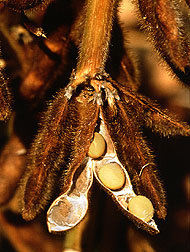This page has been archived and is being provided for reference purposes only. The page is no longer being updated, and therefore, links on the page may be invalid.
Syncing Soybeans with Rain Boosts YieldsBy Tara WeaverJanuary 8, 1998 Farmers who plant soybeans earlier in the mid-south region can avoid drought, reap an earlier harvest, and maximize their yields, an Agricultural Research Service scientist reports. Growers in Mississippi, Arkansas, Louisiana and western Tennessee usually plant their soybeans in May and June. But ARS agronomist Larry G. Heatherly at the Soybean Research Unit in Stoneville, Miss., has developed an Early Soybean Production System (ESPS)--a plan for planting early-maturing soybean varieties in April. The early planting brings the plants into sync with the weather. The plants demand more water during their reproductive stage, and the early planting means they'll be going through that developmental phase during the high-rainfall season from April through June. Drought is common in the mid-south region later in the growing season from July through early September. That means plants sown on the conventional timetable develop pods and seeds and fill these seeds during the hot, dry months when water is scarce. In a three-year field study, the ESPS outperformed conventional soybean plantings. ESPS soybean plants will also be harvested earlier than those planted in the conventional system, so growers may benefit from a higher price received for their early delivery. Another advantage of ESPS--avoiding the bug feeding frenzy. According to Heatherly, ESPS should allow soybeans to avoid late-season, foliage-feeding insects. That's because by then, the plants have matured and aren't as susceptible to insect damage. Dry spells are the main reason soybean yields have remained about the same for 30 years. But farmers might change that--and boost their profits--by planting an earlier crop. Scientific contact: Larry G. Heatherly, Soybean Research Unit, Stoneville, Miss., phone (601) 686- 3128, fax (601) 686-3140, lheather@ag.gov.
|

